Best HDMI 2.1 cables for PS5 & Xbox 2024
Time to ditch the 2.0 cable for a newer HDMI 2.1 cable for your PS5 or Xbox, which can support up to 8K resolution.
If you're a gamer who's into Xbox, PlayStation, or both and plan to get your hands on the PS5 or Xbox Series X (or maybe you were already lucky enough to pick one up), chances are you'll want the best experience possible.
This requires loading up on some great PS5 accessories, including the best HDMI 2.1 compatible cables you can find to support higher resolutions, more bandwidth (up to 48Gbps), faster refresh rates like 120Hz and 144Hz, and dynamic HDR. Here are the best HDMI 2.1 cables to enhance your gaming experience even further!
The best HDMI 2.1 cables for PS5 and Xbox
Why you can trust Android Central
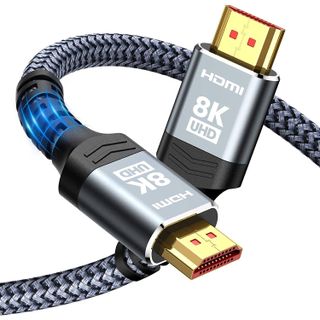
Connections up to 100 feet
It's still early days for 8K, but if you have a future-friendly set-up for your intense video gaming sessions, this cable can support 8K at 60Hz and 4K at 120Hz to accurately reproduce every scene in the game in stunning clarity. The braided cord will ensure it won't break or fray, along with the anti-bending design and 24K gold-plated plug part material. The 6.6-foot length should suit most needs, but you can also opt for lengths up to 100 feet.
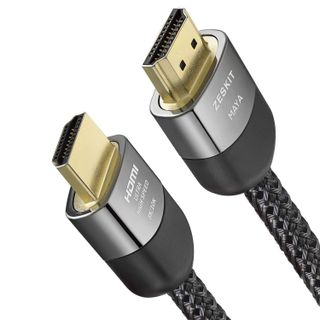
8K for an affordable price
While the brand name might not be familiar, the reviews say it all: This cable is a good option for everything from gaming, to other home theater gear. Available in 1.5 to 10-foot lengths, it supports Dolby Atmos and Dolby Vision for immersive sound to accompany your gameplay (with compatible AV equipment, of course), and is backward-compatible with other HDMI versions. You can plug it into virtually any HDMI device.
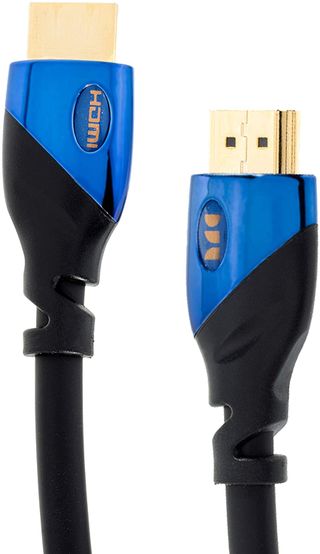
Brand name dependability
Monster was known for manufacturing audio/video cables long before making headphones, speakers, and other devices. These cables come at a premium, but you get the brand name prestige, along with features like Enhanced Audio Return Channel (eARC) for supporting most audio formats and uncompressed, lossless multichannel audio for the most immersive gaming experiences. Unfortunately, it doesn't feature a braided cable.
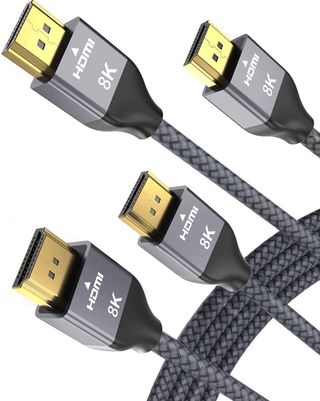
Worry-free warranty
Get two 10-foot cables in this package (other sizes available from 3.3-16.5 feet), so you can connect multiple gaming consoles and other devices to different HDMI inputs on your TV, instead of having to swap back and forth when you go from PS5 to Nintendo Switch. They include gold-plated connectors, three-layer copper shielding to minimize signal interference, and a nylon-braided jacket.
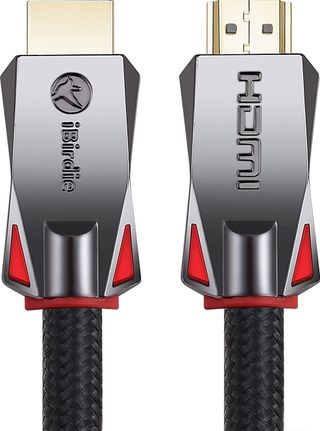
High-speed connection
While many of the cables on this list come in other sizes as well, this is one of the few that you can get in a super long 20-foot length for connecting in hard-to-get places, or running the cable against the wall to a console far from the TV. The sheath is made of an ultra-durable nylon braid as well.
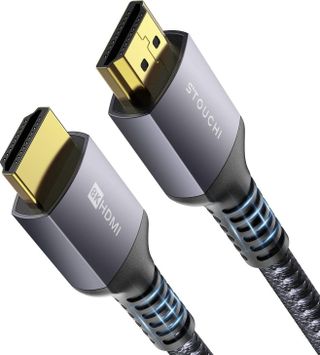
Compatible with most devices
Access extremely high data transmission speeds of up to 48Gbps with the Stouchi HDMI 2.1 cord. You get Dolby compatibility and eARC support for enhanced audio. It supports 8K at 60Hz, 4K at 120Hz, and an ultra-high 144Hz refresh rate. The 6-foot option should be long enough, but you can also choose 4-foot, 10-foot, and 15-foot lengths.
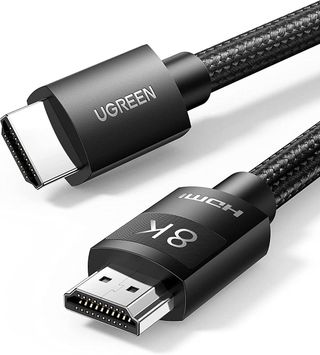
Dynamic HDR & enhanced audio
UGREEN is known for its high-quality cables, so an HDMI 2.1 cable from the brand is reliable. You can choose from three cable lengths: 6-foot, 10-foot, and 15-foot. It can support 4K at 120Hz and 8K at 60Hz, Dynamic HDR, eARC, and Dolby Atmos. Constructed with nickel-plated connectors and a durable nylon braided jacket, this HDMI 2.1 cable is built to last you a long time.
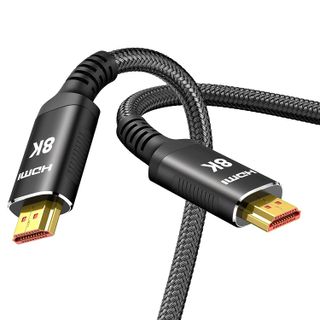
Braided for durability
Braided HDMI 2.1 cables are much more durable than their counterparts, making them an excellent choice in a packed market. This one in particular is rated for 25,000 flex times and uses a 24K gold-plated plug. With 48Gbps transmit speeds, HDR10 and eARC support, and 8K video support, it does everything a good HDMI 2.1 cable should.
What is HDMI 2.1?
To put it simply, HDMI 2.1 can transmit more data at faster speeds and at better qualities than HDMI 2.0. Where 2.0 only supports up to 4K and transmit speeds up to 18Gbps, the best HDMI 2.1 cables offer support for higher resolutions up to 10K and bandwidth up to 48Gbps, along with faster refresh rates of up to 120 FPS.
These features are critical for gaming, especially when playing intense, fast-action, or first-person-shooter (FPS) games where every millisecond counts. You can't have any lag, inaccurate colors on the screen, or missing details. Making sure every component in the setup is top-notch can make the difference between a big win and an embarrassing loss.
Do HDMI 2.1 cables work with 2.0?
Yes, HDMI 2.1 cables are backward compatible and can be plugged into devices featuring 2.0 ports, but you won't get the full benefits of 2.1 like 48Gbps bandwidth and 8K resolution support. Any HDMI 2.1 cable plugged into a 2.0 port will work fine and transmit data at 2.0's fullest capabilities, meaning you'll be getting 4K video at 18Gbps.
Do you need HDMI 2.1 for PS5 and Xbox Series X?
Both the PS5 and Xbox Series X already come with an HDMI 2.1 cable included in the box, so that part should be out of the way. If your TV only has a 2.0 port, then stated earlier, you'll only be getting HDMI 2.0 benefits out of that 2.1 cable, so any PS5 games with 120 FPS support won't be able to take advantage of it.
If for some reason you lose that HDMI 2.1 cable or just want to use it for something else, you can also use an HDMI 2.0 cable with PS5 and Xbox Series X. This will just result in a similar situation where you'll only receive HDMI 2.0 benefits.
Whether those benefits are worth it is entirely up to you. I personally don't see a need for 8K or even 10K resolution (our eyes can't really discern the different between the two, anyway). But faster frame rates are important to a lot of people.
Why get an HDMI 2.1 cable?
You probably upgraded to a 4K TV from HD before 4K movies, video games, and TV series were released. Or you even had a 4K source in the home, like a 4K set-top-box or top-tier streaming service subscription. In the same way, you might also buy an 8K TV even if there isn't any 8K content available yet. It's never a bad idea to future-proof your investments, if you can afford to.
While most of these cables come in various lengths, a standard 10-foot cable length will do for most. You'll find this with the Basesailor HDMI Cable, which even comes in a two-pack if you're lucky enough to own two consoles, or just want to connect a second HDMI device or keep one as a spare.
If, for whatever reason, you need to situate the gaming console farther away from the TV or receiver, and thus need to run a really long cable along the side of the wall, consider an option like the 20-foot iBirdie HDMI 2.1 Cable, which leaves plenty of room to roam.
How to choose the right HDMI 2.1 cable for you
When it comes to HDMI 2.1 cables, despite any fancy buzzwords that companies may use, they all perform about the same. The differences for people will usually come down to their length and if the cord is braided or not.
A braided cable will typically last longer, is less prone to tangles, is more flexible, and is generally just more resilient than rubber cables. They won't offer much of a difference in terms of performance — HDMI 2.1 is the same regardless of whether or not the cable is braided — but for peace of mind and to get your money's worth, braided is the way to go.
Be an expert in 5 minutes
Get the latest news from Android Central, your trusted companion in the world of Android

Christine Persaud has been writing about tech since long before the smartphone was even a "thing." When she isn't writing, she's working on her latest fitness program, binging a new TV series, tinkering with tech gadgets she's reviewing, or spending time with family and friends. A self-professed TV nerd, lover of red wine, and passionate home cook, she's immersed in tech in every facet of her life. Follow her at @christineTechCA.
- Jennifer LockeGames Editor - PlayStation, Android, VR
- Anthony J Nash
